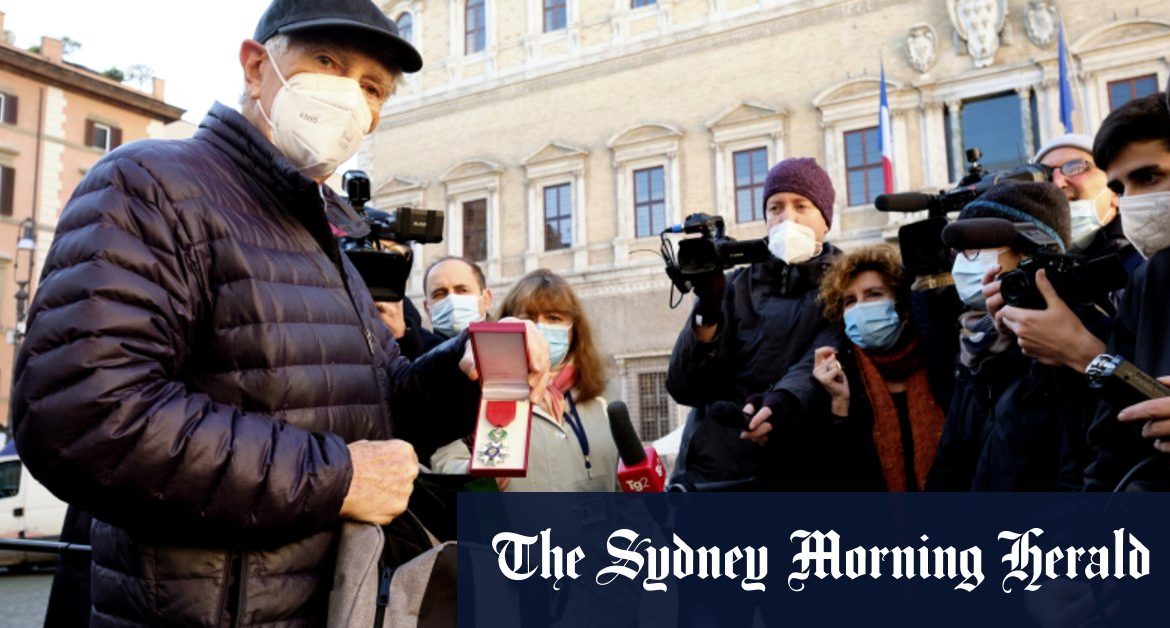Also last week, Rome prosecutors formally placed four high-ranking members of Egypt’s security forces under investigation over the death of Giulio Regeni, whose 2016 killing strained relations between Rome and Cairo and galvanised Italy’s human rights community.
Speaking outside the French Embassy, Augias said he returned his 2007 prize out of “a sense of indignation,” given that the award was bestowed on al-Sisi at the same time that Rome prosecutors were detailing the torture that Regeni suffered to a parliamentary committee.
Corrado Augias, a longtime journalist for La Repubblica, shows reporters his French Legion of Honour award prior to returning it to French embassy to Italy, in Rome.Credit:AP
“The two things together were too strong,” he told reporters. “I couldn’t refrain from reacting.”
Melandri said in a Facebook post on Monday that she too would return the honour she received in 2003, saying it was sad but necessary to make clear that “honour” should mean something.
“I hope that this gesture can help open a frank and friendly confrontation in our two countries on which values should be that we want to defend, strengthen and continue to ‘honour’ in a democratic Europe and a globalised world,” she wrote.
Al-Sisi’s state visit had sparked protests by human rights activists incensed that France was welcoming al-Sisi despite the heaviest crackdown on dissent in Egypt’s modern history. At the time, it wasn’t known that Macron had awarded al-Sisi the highest distinction of the Legion of Honour order of merit, the Grand-Croix, or Grand-Cross.

French President Emmanuel Macron, right, and Egyptian President Abdel-Fattah al-Sisi attend a joint press conference at the Elysee palace.Credit:AP
The award ceremony was held without the press before dinner at the Elysee presidential palace in Paris. The event was not listed on Macron’s official agenda.
The French presidency said such a ceremony is usually part of the protocol during state visits.
The French ambassador to Italy, Christian Masset, said he respected Augias and defended the government’s human rights record.
“France is on the front lines for human rights and makes no compromises,” he tweeted after Augias returned his prize. “Many cases were discussed during President al-Sisi’s visit to Paris, in the most appropriate and efficient way.”
The Legion of Honour has been given to French war heroes, writers, artists and businessmen. But it has also been given to leaders with questionable human rights records, including Syrian President Bashar Assad (though he returned it in 2018) and Russian President Vladimir Putin.

President El-Sissi has come under fire for the handling of death of Italian student Giulio Regeni.Credit:AP
France has on occasion also stripped people of the honour, including Harvey Weinstein in 2017, in the wake of the #MeToo sexual misconduct accusations against him.
During the visit, France and Egypt signed contracts for French development aid and hospital and transport cooperation.
At his news conference with al-Sisi, Macron justified such cooperation and ruled out making it conditional on human rights issues, saying Egypt is France’s key partner in the fight against extremism.
“It would be ineffective in terms of human rights and counterproductive in the fight against terrorism — that’s why I won’t do that,” he said.
New York Times
Most Viewed in World
Loading







